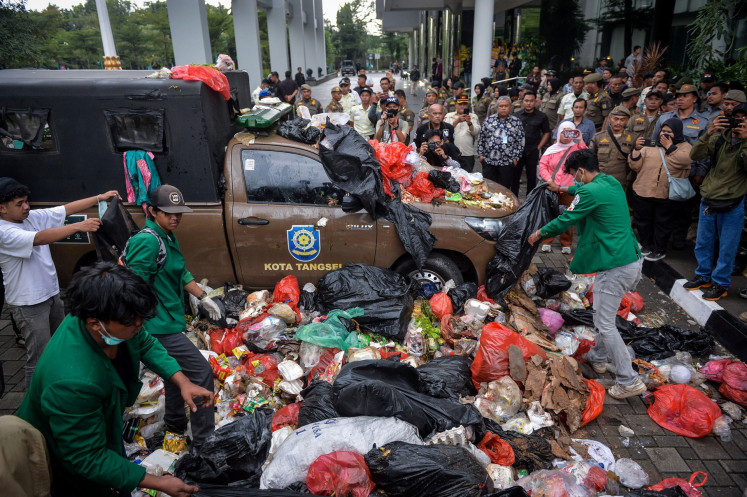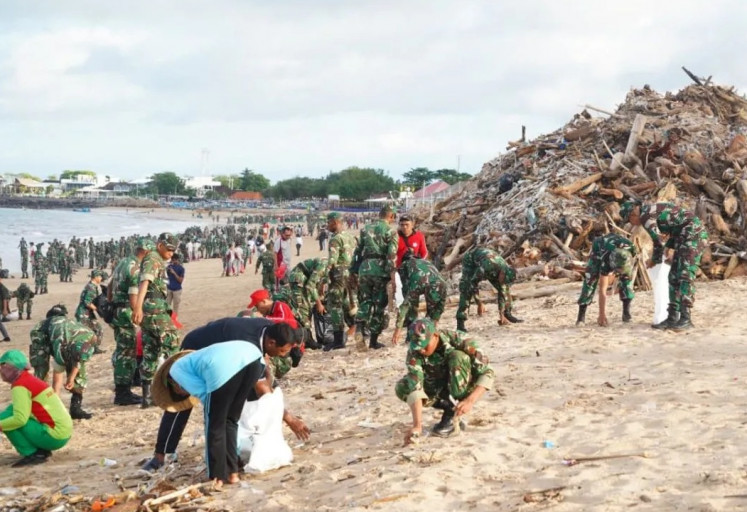Popular Reads
Top Results
Can't find what you're looking for?
View all search resultsPopular Reads
Top Results
Can't find what you're looking for?
View all search resultsNew approach in Papua
Civil society, religious leaders and other prominent figures in Papua have repeatedly asserted that the militaristic approach will not be able to end the decades-long conflict in the natural resource-rich territory, but they say dialogue would.
Change text size
Gift Premium Articles
to Anyone
R
ecently appointed Indonesian Military (TNI) commander Gen. Andika Perkasa has attracted public attention with his plan to change the way the institution deals with longstanding separatism in Papua. He says the TNI will treat Papua like the nation’s other provinces, in that territorial operations will manifest as civic action programs.
In the words of new Army chief of staff Gen. Dudung Abdurachman, the military will emphasize “love and affection”, a stark contrast to the use of force that has for decades characterized the TNI’s presence in the easternmost part of the country.
Such statements imply that the two generals have accepted that the militaristic approach will not address Papua’s resentment of Jakarta. The fact that they understand the problem does not necessarily mean the TNI’s operations in Papua will drastically change, but we can hope the military will at least be more willing to work with other elements of society and the government to resolve the complex problems facing the Papuan people.
Andika aims to reverse the current deployment of troops, which human rights activists say has turned Papua into “a war zone”. Civil society, religious leaders and other prominent figures in Papua have repeatedly asserted that the militaristic approach will not be able to end the decades-long conflict in the natural resource-rich territory, but they say dialogue would.
Andika said the new paradigm would implement President Joko “Jokowi” Widodo instructions as the TNI’s supreme commander. The Army chain of command, from the provincial military command (Kodam) to the lowest unit, as well as the Air Force and Navy structures in Papua and West Papua, will return to their original functions as laid out in TNI procedure.
The TNI must prepare a long-term strategy to deal with threats to the country’s territorial integrity that will persist despite the new approach. The most important mission for the military is to win the hearts and minds of Papuans.
On Sunday, an Army soldier was wounded after an armed group attacked a military post in the remote village of Titigi in Intan Jaya regency. A week earlier, three Army soldiers were shot dead in Jenggernok village in Puncak regency.
Dudung said that while the hunt for separatist groups would continue, soldiers should treat all Papuans, even armed separatist groups, with more empathy because they were all citizens of Indonesia. The statement quickly sparked controversy, with critics claiming Dudung was tolerating criminals who had killed TNI soldiers and civilians.
Clearly, the two generals are aware that the use force should only be the last resort. They intend to promote the use of soft power, rather than hard power, the latter of which has proven unable to end hostilities in Papua.
Despite the massive infrastructure projects and huge amount of special autonomy funds granted to Papua, many residents feel Jakarta has abused their basic human rights and unfairly extracted their natural resources for decades. They have been left far behind the rest of the nation and are treated as second-class citizens. Repeated instances of racist behavior, both individual and institutional, have only increased Papuans’ alienation.
For these reasons, we welcome the vision of the two generals, who are opting for a more humanitarian approach in Papua. Let us give Andika and Dudung a chance to realize their promises.











